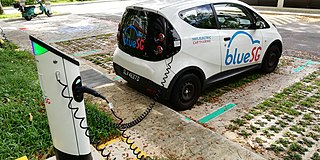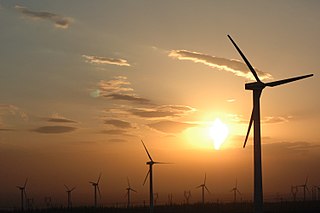Related Research Articles

Hitachi, Ltd. is a Japanese multinational conglomerate founded in 1910 and headquartered in Chiyoda, Tokyo. The company is active in a range of industries, including digital systems, power and renewable energy solutions, railway systems, healthcare products, and financial systems.

ABB Ltd. is a Swedish–Swiss multinational corporation headquartered in Västerås, Sweden, and Zürich, Switzerland. It is traded on the SIX Swiss Exchange in Zürich, the Nasdaq Nordic exchange in Sweden and the OTC Markets Group's pink sheets in the United States. It was ranked 340th in the Fortune Global 500 list of 2020 and has been a global Fortune 500 company for 24 years.

Clean technology, also called cleantech or climatetech, is any process, product, or service that reduces negative environmental impacts through significant energy efficiency improvements, the sustainable use of resources, or environmental protection activities. Clean technology includes a broad range of technology related to recycling, renewable energy, information technology, green transportation, electric motors, green chemistry, lighting, grey water, and more. Environmental finance is a method by which new clean technology projects can obtain financing through the generation of carbon credits. A project that is developed with concern for climate change mitigation is also known as a carbon project.

Renewable energy commercialization involves the deployment of three generations of renewable energy technologies dating back more than 100 years. First-generation technologies, which are already mature and economically competitive, include biomass, hydroelectricity, geothermal power and heat. Second-generation technologies are market-ready and are being deployed at the present time; they include solar heating, photovoltaics, wind power, solar thermal power stations, and modern forms of bioenergy. Third-generation technologies require continued R&D efforts in order to make large contributions on a global scale and include advanced biomass gasification, hot-dry-rock geothermal power, and ocean energy. In 2019, nearly 75% of new installed electricity generation capacity used renewable energy and the International Energy Agency (IEA) has predicted that by 2025, renewable capacity will meet 35% of global power generation.

The Clean Tech Revolution: The Next Big Growth and Investment Opportunity is a 2007 book by Ron Pernick and Clint Wilder, who say that commercializing clean technologies is a profitable enterprise that is moving steadily into mainstream business. As the world economy faces challenges from energy price spikes, resource shortages, global environmental problems, and security threats, clean technologies are seen to be the next engine of economic growth.
Clint Wilder is a business journalist who has covered the high-tech and clean-tech industries since 1985.

Clean Energy Trends is a series of reports by Clean Edge which examine markets for solar, wind, geothermal, fuel cells, biofuels, and other clean energy technologies. Since the publication of the first Clean Energy Trends report in 2002, Clean Edge has provided an annual snapshot of both the global and U.S. clean energy sector markets.

China is the world leader in wind power generation, with the largest installed capacity of any nation and continued rapid growth in new wind facilities. With its large land mass and long coastline, China has exceptional wind power resources: Wind power remained China's third-largest source of electricity at the end of 2021, accounting for 7.5% of total power generation.
Tetra Tech, Inc. is an American consulting and engineering services firm based in Pasadena, California. The company provides consulting, engineering, program management, and construction management services in the areas of water, environment, infrastructure, resource management, energy, and international development. Specific services for consulting and engineering projects include applied science, information technology, engineering, design, construction management, and operations and maintenance.
Smart grid policy in the United States refers to legislation and other governmental orders influencing the development of smart grids in the United States.

Gregory H. Kats is an American businessman, environmentalist, and thought leader in the green economy sector. He is founder and CEO of the Smart Surfaces Coalition, a non-profit organization consisting of 40+ national and international partner groups working to ensure the rapid, cost-effective adoption of reflective, porous, and green urban surface infrastructure, or "smart surfaces", in cities. Previously, Kats served as a Managing Director at Good Energies,[2] a multi-billion dollar global clean energy investor, and Director of Financing for Energy Efficiency and Renewable Energy at the U.S. Department of Energy (DOE).[3]

China is the world's largest consumer of electricity, and its demand is expected to double by the next decade, and triple by 2035. In 2010, 70 percent of the country's electricity generation came from coal-fired power plants, but the Chinese government is investing heavily in renewable energy technologies. As of 2013, 21 percent of China's electricity generation comes from renewable sources. This represents only 9 percent of overall primary energy consumption in the country. China's latest goal is to increase renewable energy to 9.5 percent of overall primary energy use by 2015. To implement China's new clean energy capacity into the national power grid, and to improve the reliability of the country's existing infrastructure, requires significant upgrades and ultimately, a smart grid.

Clean Tech Nation: How the U.S. Can Lead in the New Global Economy is a 2012 book written by Ron Pernick and Clint Wilder. The book surveys the expansion of clean technology and renewable energy over the past decade. It tracks the growth of wind power and solar photovoltaics and shows that these markets grew 20 fold from 2000 to 2010. Factors which are driving the global expansion of clean tech are identified, as are the new economic opportunities which are being created. China, the United States, and Germany are leading the way. Clean Tech Nation is the sequel to the 2007 book The Clean Tech Revolution.
Clean Edge, Inc., founded in 2000, is a U.S.-based developer and publisher of thematic stock indexes tracking clean energy, transportation, water, and the grid. The firm's first index, the Nasdaq Clean Edge Green Energy Index (CELS), was launched with Nasdaq in 2006. Financial products tracking the firm's indexes and universes exceed $2.5 billion in assets under management.

Jigar Shah is the director of the Loan Programs Office in the US Department of Energy. Since the passing of the Bipartisan Infrastructure Law and Inflation Reduction Act through Congress in 2022, the funds to the Loan Programs Office increased tenfold from $40 billion to $400 billion in order to commercialize emerging clean energy technologies. Shah leads the office in churning out million and billion dollar loans to clean energy technologies majorly advancing the Biden Administration’s efforts to bring clean energy into the United States.

Peter L. Corsell is an American technology entrepreneur, leader, and investor. A repeat entrepreneur in the sustainable energy industry, Corsell founded GridPoint in 2003, and Twenty First Century Utilities in 2015.

Thomas H. Stoner Jr. is lead director and a co-founder, along with Nobel laureate David Schimel of the Jet Propulsion Lab (NASA) and other leading climate experts, of Entelligent, a global provider of Smart Climate indexes, predictive equity portfolio analytics and advanced data on climate risk and climate transition. He served as CEO of Entelligent from 2017 to October 2023. Prior to Entelligent, Stoner founded Project Butterfly, a research organization that advocates primarily for the global capital markets as a solution to climate change. The research produced by Project Butterfly led to the creation of Entelligent and ultimately yielded two climate risk patents issued by the USPTO. Stoner is also the author of the 2013 book, "Small Change, Big Gains: Reflections of an Energy Entrepreneur," which includes research about transforming the global energy supply to be more reliant on sustainable fuel sources by the end of the century. Stoner has been a promoter of sustainable development for over 30 years, having built, financed and owned and operated renewable energy projects throughout the Americas. He has led three companies in the clean technology space, including one of the original cleantech venture funds backed by international development banks, including the Multilateral Investment Fund, a division of the Inter-American Development Bank.
The green bubble is an economic theory that the world is facing an over-investment in renewable energy and that the current levels of debts in many clean technology companies are unsustainable. As the interest rate rises many clean technology projects will go bust, a major setback for the renewable energy industry.
Science and technology in Kazakhstan – government policies to develop science, technology and innovation in Kazakhstan.
References
- ↑ Anderson, Leonard (August 5, 2007). "For investors, a heads-up on clean tech". The Boston Globe.
- ↑ "Clean Tech's First Decade | Greenbiz". www.greenbiz.com. Retrieved 2020-12-30.
- ↑ "Clean Edge - the Clean-Tech Market Authority". Archived from the original on 2012-11-07. Retrieved 2012-10-02.
- ↑ Ron Pernick (2012). "Clean Energy Trends 2012" (PDF). Clean Edge. p. 7.